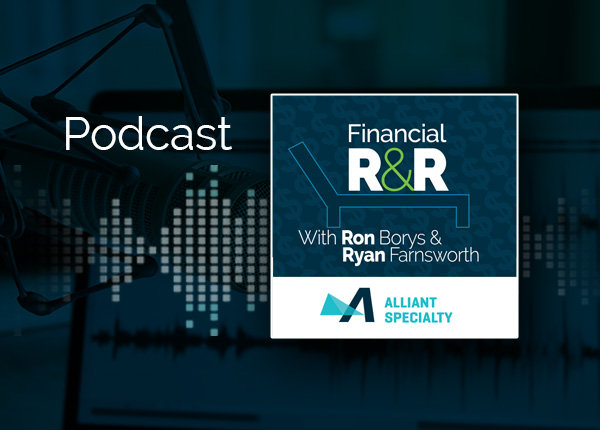
SEC Enhances the Regulation of Private Fund Advisers
By Alliant / August 25, 2023
On August 23, 2023, the Securities and Exchange Commission (SEC) adopted new rules and amendments under the Investment Advisers Act of 1940 that represent the most significant changes to private fund and adviser regulations since the Dodd-Frank Wall Street Reform and Consumer Protection Act (Please refer to the Fact Sheet for “Private Fund Advisor Reforms: Final Rules” here).
While the final rules and amendments may have been a scaled-back version of the rules that were originally proposed in February 2022, Alliant expects that asset management firms will experience significant administrative and compliance burdens as they seek to comply with the final rules within the timelines outlined by the SEC. Alliant strongly encourages all private fund advisers to seek appropriate legal advice in order to be in compliance with the final rules prior to the applicable compliance dates.
As the leading provider of risk advisory and insurance brokerage services to the asset management industry, we have prepared a summary of preliminary questions and commentary with respect to risk management and insurance procurement efforts in response to the final rules.
1. How will the final rules impact the procurement of investment management and fund liability insurance?
It could have been a lot worse! Both policyholders and insurers of investment management and fund liability insurance were uncertain as to how the insurance markets would respond to the SEC’s proposed rules should they have been fully implemented as originally proposed. The potential limitations on indemnification and the prohibited allocation of certain fees and expenses could have had a devastating impact on an adviser’s costs with respect to insurance premiums and related risk management efforts. As discussed below, the effects of the final rules will still reverberate across the underwriting and placement process for many years to come, but policyholders appear to be breathing a sigh of relief that the current favorable market conditions will not be deterred by never-before-seen limitations that would have placed incredible frustration and higher costs on the procurement of investment management and fund liability insurance.
2. Will the final rules result in changes to policy language within investment management and fund liability insurance?
Fortunately, we do not expect that the final rules will directly result in insurance companies trying to impose unfavorable policy language or coverage limitations. On the other hand, policyholders should absolutely take this opportunity to reevaluate their risk profile and insurance-related priorities and seek to capitalize on an extremely favorable insurance market. While the SEC’s proposed rules remained in limbo for 18 months, prudent policyholders jumped at the opportunity to reconsider their insurance program, evaluate coverage options and work with their broker to broaden the scope of coverage before the rules were approved. Now that we are aware of the final rules, there is no reason why that posture has to change. One critical amendment that was included in the final rules mandates all registered advisers, including those that do not necessarily advise private funds, to document in writing the annual review of their compliance policies and procedures. This annual attestation may cause serious concern that a private fund adviser would be set up for enforcement actions or other harsh criticism from the SEC, so we encourage all policyholders to evaluate whether their coverage is appropriate for expected regulatory activities in order to protect their firm and their individuals.
3. What happened to the proposed rule prohibiting an adviser from seeking reimbursement, indemnification, exculpation or limitation of its liability involving common adviser activities?
One of the SEC’s proposed rules would have prohibited advisers from seeking indemnification from private funds or other investors for what had become common scenarios such as negligence and breach of fiduciary duty. While always important, a strong insurance program would have become paramount since it would have been the only protection standing between an adviser’s balance sheet or a principal’s personal assets. Following an extensive comment period, the SEC made several key changes from the originally proposed rules, and the prohibition on limiting or eliminating liability was ultimately not included in the final rules. Notwithstanding, it should be noted that in the adopting release of the final rules, the SEC reminded advisers that while they are not adopting this prohibition, they continue to have an “obligation to act consistently with their Federal fiduciary duty and their legal obligations under the Advisers Act, including the antifraud provisions.” As noted above, many feared that the proposed limitation on indemnification would have increased litigation and other costs, including higher insurance premiums, higher management fees, etc. The SEC appears to be content with reinforcing the same fiduciary duty standards previously outlined in the “2019 IA Fiduciary Duty Interpretation” and continuing to maintain consistent standards instead of an addition to the final rules; however, the final rules should not deter an adviser from maximizing insurance coverage protections available through the current insurance market.
4. Weren’t the proposed rules also meant to limit charging or allocating fees or other expenses (e.g., insurance premiums) to a private fund?
The SEC had proposed wide-ranging rules prohibiting an adviser from charging or allocating various fees to a private fund. Many had questioned whether the traditional practice of allocating a portion of the annual insurance premiums to the fund would be quelled and may result in an increased cost of 4x or 5x for some advisers, based on current allocation methods. Similar to the proposed limitation on indemnification, the SEC determined that there would not be a specific restriction in the final rules, but the SEC did note that all fee allocation practices should be consistent with an adviser’s fiduciary duty.
From the adopting release: “As we are not flatly prohibiting advisers from passing on compliance, regulatory, and examination expenses, we do not believe it is necessary to describe which fees and expenses are related to the adviser’s activities or the fund’s activities. Advisers and investors may negotiate whether certain compliance, regulatory, or examination fees and expenses are charged to a fund, provided that the disclosure of such fees and expenses satisfies the requirements of the rule.” However, the SEC did place a prohibition on charging or allocating expenses to a private fund if they are associated with an investigation of the adviser or its insured persons by a governmental or regulatory authority that results in a sanction for a violation of the Advisers Act. We highly recommend that each private fund adviser understand the scope of coverage for investigations, inquiries and other policy terms and conditions that would come into play during these scenarios where an insurance policy may be the first (and only) line of defense.
5. What should private fund managers expect as part of the next renewal process for their firm’s investment management and fund liability insurance?
Private fund managers should expect an increased level of underwriting scrutiny for the next several years as insurance underwriters seek to better understand how firms are complying with the new rules and amendments for private fund managers as well as how the SEC staff is applying certain aspects of the new rules and amendments during examinations. Underwriters will perceive compliance with the final rules as a meaningful shift in risk exposure that may result in meaningful litigation or enforcement actions from the SEC, which would also result in increased defense fees, fines, penalties, settlements and other amounts, all subject to coverage under a firm’s investment management and fund liability insurance depending on scope of coverage negotiated in the policy. Underwriters will expect to have access to the additional client disclosures and other information which the SEC will require to increase private fund investor protections. Private fund managers should be ready to counter these underwriting requests by articulating how the firm is investing in its compliance, legal and administrative resources in a similar way that managers were challenged to evidence their “culture of compliance” following the implementation of the Dodd-Frank Act. Starting early and implementing a strategic risk differentiation process will drive measured success to obtain the most favorable terms and conditions.
For more information, visit alliant.com/financialinstitutions
Alliant note and disclaimer: This document is designed to provide general information and guidance. Please note that prior to implementation your legal counsel should review all details or policy information. Alliant Insurance Services does not provide legal advice or legal opinions. If a legal opinion is needed, please seek the services of your own legal advisor or ask Alliant Insurance Services for a referral. This document is provided on an “as is” basis without any warranty of any kind. Alliant Insurance Services disclaims any liability for any loss or damage from reliance on this document.




